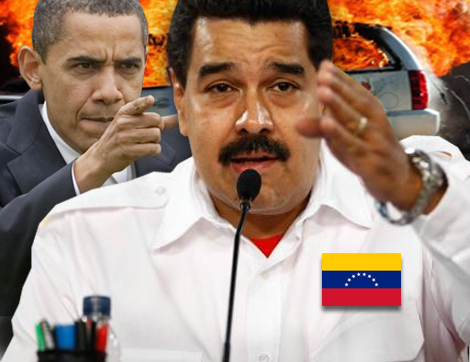
• Ousted U.S. consular officials caught conspiring with protest groups.
By Richard Walker —
Continuing unrest in Venezuela can be traced to an ongoing plot by the Obama administration to topple the country’s democratically elected government and replace it with a regime run by rich families and corporations allied with Washington.
Venezuelan President Nicolas Maduro, who succeeded the late Hugo Chavez, a Washington nemesis, recently expelled three United States consular officials, accusing them of conspiring for months with protest groups funded by Washington.
The dark hand of Washington plotters has not gone unnoticed in the region with Brazil, Argentina and Paraguay claiming violence on the streets of Venezuela has been part of an effort to “destabilize the democratic order.” That observation followed Maduro’s public warning the U.S. was plotting to topple his government. A notable feature of the violence aimed at his overthrow has been the absence of the poor in street demonstrations.
For more than a decade, Washington has conspired to return wealthy Venezuelan families to power. The effort began in earnest after Chavez was elected president in 1998, following decades of Central Intelligence Agency (CIA) influence and corruption in Venezuela and neighboring countries, including Chile and Nicaragua.
The decision by Chavez to nationalize his nation’s massive oil reserves, among the world’s largest, angered rich corporations linked to Washington. The fact he also normalized relations with Cuba and Iran and established a free healthcare system made him for many members of Congress the ultimate socialist and a danger to U.S. interests in Latin America. The CIA used disinformation to portray him as a supporter of terrorism and a puppet of Cuba, both of which were untrue.
In 2002, the Bush administration backed a plot to overthrow Chavez, and it followed a predictable pattern, beginning with street demonstrations. The plot was backed by media barons allied to three Venezuelan families that had controlled the country from the 1950s until 1998.
Opposition groups received CIA support and State Department funding. On April 6, 2002, three weeks before the coup, a CIA secret briefing entitled “Conditions ripening for coup attempt” pointed out the coup would target Chavez and ten senior officers for arrest. It said the plotters hoped to provoke military action by exploiting unrest from opposition demonstrations. The coup went ahead and Chavez was arrested but was quickly released following a popular uprising.
It is no coincidence that Leopoldo Lopez, a representative of one of the three families that orchestrated the 2002 coup, has been the organizer of violent street protests in 2013-2014. Groups Lopez has been aligned with have received millions of dollars in aid from the Obama administration.
Before Chavez died in March 2013, there were already efforts underway to portray his elected successor, Maduro, as incompetent and dangerous. Just before Chavez’s death, Harold Trinkunas, a senior fellow at the Brookings Institute, in a memorandum to President Barack Obama predicted a “violent popular reaction” to the Maduro government.
“The risk of a violent outcome may still be low, but it will rise as the true extent of scarcity in Venezuela becomes apparent in the coming months. The threat to the Maduro administration may come from popular unrest, an effort by moderates in the government to oust the radicals and the president or (least likely) a traditional coup,” Trinkunas warned.
U.S. meddling in Venezuela over the past decade has been intense, and some of it has been exposed by WikiLeaks. A cable from Richard Brownfield, U.S. ambassador to Venezuela in 2006, stated the principles underpinning U.S. policy while Chavez was alive: “Penetrating Chavez’s political base . . . dividing Chavismo . . . protecting vital U.S. business [and] isolating Chavez internationally.”
Latin American governments are not the only ones concerned about events in Venezuela. While Obama has been focusing on Ukraine, Moscow’s backyard, Vladimir Putin has been keeping an eye on Venezuela. It is no coincidence a Russian spy ship recently visited Venezuela and Cuba.


